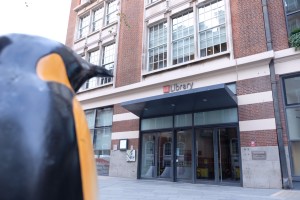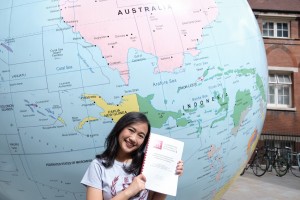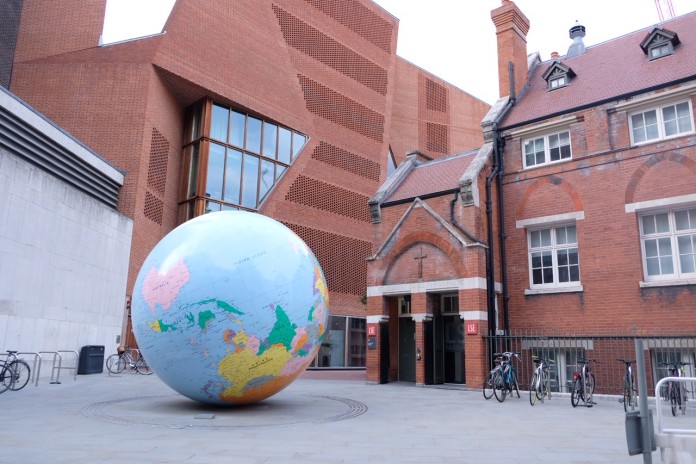You might know that The London School of Economics and Political Science (LSE) is one of the world’s top social science school, but do you know that the school has a post-graduate programme of Social Innovation and Entrepreneurship as well? The programme is still young, but it is full of wonder and eye-opening experience. Read Nadia’s story why she chose the programme and what she gained during her year studying in Central London.
A lot of people might recognise LSE as one of the top social science schools in the world. However, that was not my only reason to put LSE as my number one post-graduate dream school. Two years ago, LSE launched its MSc in Social Innovation and Entrepreneurship programme. When I found the programme, I thought it was something that I was looking for. Although I never had formal experience in the field of social impact, all the experience I had made me contemplate about what I want to do with my capabilities and what I want to pursue in life. To me, the motivation to learn about social entrepreneurship happened as a gradual process.

Doing business is always my passion. When I was younger, I loved to create small stuff and sell them to people around me. I like the process of creating something that people like. I studied business in my undergraduate study at the Faculty of Economics & Business of Universitas Gadjah Mada. I also have a special connection with marketing. In fact, I was doing a marketing job for three years (which I loved very much) before I decided to pursue my masters at LSE. It felt good to know what you like and what you are good at. However, there were some questions that I kept asking myself: “How can I, with my knowledge and capabilities, help other people?” and “How can I use the privilege to lift others who may not get an equal chance?”. What I had done so far was sharing my experience with others. I also initiated a voluntary teaching programme for kids around my neighbourhood when I was in university, where I taught free English lessons to underprivileged kids. But “what if I can do more?” I wondered.

Then, I was inspired by the rise of start-ups in Indonesia and around the world who are using business to promote good causes creatively. I wanted to know more about them: What inspired them? How could they come up with an innovative solution? How can they be financially sustainable at the same time? And so forth. Social innovation is something we do not (yet) talk about very much in Indonesia. Hence, I made up my mind to apply for the programme. Finally, LSE was not just written on my dream-lists, it was time for me to move it into my short-term goals lists. I went through the process of applying for the school and the government’s scholarship (LPDP Indonesia), and I am very grateful that the door was opened for me.
I would like to say that I started my master’s programme with little knowledge of social entrepreneurship. As people might say, I was an empty glass ready to be filled with the knowledge-juices from the programme and people around me. The programme did answer the questions I had about social entrepreneurship: 1) How do I examine social problems and find the root cause of the issues? 2) How to develop a sustainable solution to address the issues? It did so by giving us the modules relevant to build a social innovation to create social impacts. The programme was also taught by professors who are experts on social impacts. The challenging tasks in the programme were design to equip me with the skills and capabilities needed to become a social entrepreneur or if I want to apply social entrepreneurship into an organisation. In addition, throughout my academic year at LSE, I have three major highlights:
- How diverse my classmates are
From the first day, I was already so impressed by all my classmates. We were a cohort of people from different background and nationalities. I have classmates who worked at social enterprises, international organisations, NGOs, private companies, governments, and as academicians. It was very nice to learn from each other, have a lively discussion fruitful of point-of-views, and to network with people with the same passion from all over the world.

- I went to South Africa for a field trip to develop a social enterprise solving healthcare and youth unemployment issue
As part of my programme, I worked in a group project for a year with a team consisting of my classmates from Thailand, Japan, China and Ecuador. We were assigned to conduct a project regarding social issues happening in Gugulethu, one of the biggest townships in South Africa located near Cape Town. This project included one-week fieldwork in South Africa, where I met local people to understand their difficulties and their aspiration in their life. This trip gave me the real experience to examine social problems and to develop an innovative sustainable solution to solve their problems. The issues that my team was working on were healthcare and youth unemployment, those are two of the significant social problems faced by the South African communities. We developed a business model of a social enterprise to solve those problems. My team also got the chance to pitch the business model in the Hult Prize competition.
- I worked with early-stage entrepreneurs in Indonesia in my dissertation project

I terminated my MSc journey with a dissertation project about early-stage entrepreneurs in Indonesia. I picked this topic as I always wanted to apply the knowledge and my resources to examine the issues in Indonesia. During my dissertation work, I discussed with young early-stage entrepreneurs to understand their challenges and their aspirations. I also spoke to few organisations who are working to support the growth of young entrepreneurs in Indonesia. I hope that my dissertation work can be a small step which will lead to a more significant contribution to the development of entrepreneurs and social entrepreneurs in Indonesia.
My experience in studying Social Innovation & Entrepreneurship has given me a novel point-of-view of how an organisation or an enterprise can help to solve social issues. It inspired me to think creatively on how can we contribute to creating positive changes in society. Social innovation can be applied to any issue that we are passionate to solve, for example, education, health care, equality, environment, and so forth. I think it is a fascinating topic that must be discussed more widely in Indonesia. I am inviting anyone who is interested to discuss or to learn more about this topic with me. Or we can also spread the words to the community! 🙂








